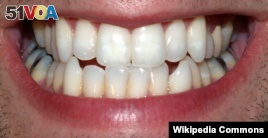October 02,2013
Olympic athletes train long and hard to achieve peak performance. But a new study indicates training should include regular dental check-ups. More than 300 athletes at the 2012 London Olympics took part in a survey on oral health. They represented 25 sports, with most competing in track and field.

Healthy teeth and gums can help athletic performance
Ian Needleman, who led the research, said, “We put together a hypothesis that since oral health can affect quality of life it could have an impact on their training and performance. And that's really what led to this research.”
Needleman is professor of restorative dentistry and evidence-based health care at the University College London Eastman Dental Institute.
“What we did for the day to day research was to carry out a detailed examination of the oral health of athletes. And these were athletes participating in the games that came along to the dental clinic. And the dental clinic is part of a major medical facility that’s always available in the Olympic village to games’ participants,” he said.
Athletes underwent examinations of their mouths, teeth and gums.
“We found a lot of tooth decay, which was surprising. More than half of athletes had tooth decay. And for a lot of them it wasn’t just one tooth. It was many teeth. But apart from that, lots of other issues – gum disease, which was really present in a lot of the athletes. Dental erosion, which is teeth wearing away due to acidic food and drinks. And trauma – damage which you might expect from some sports, which involve contact or risk of trauma,” he said.
Needleman said that the oral problems are surprising, given the fact that many athletes are only in their teens and 20’s.
“They’re a young group. They are otherwise very well supported medically – very health aware and training aware. But for some reason oral health doesn’t seem to have got onto the radar.”
Researchers also collected a lot of anecdotal evidence about how poor oral health affected competitors.
“It might have been pain preventing them training. And then one young guy telling us that he really hadn’t been able to train properly for a year, which is an extraordinary condition to be in. And clearly, if his training was affected then performance would be. We know very well that oral health problems can affected people’s confidence. People, for instance, who have frequently bleeding gums, often feel a bit embarrassed about that – less confident about being with others. And sport performance is to a great extent related to confidence,” he said.
Problems were found even among U.S. athletes, despite the wide availability of dental care in the country.
Needleman said there’s also growing evidence that infection or inflammation in the mouth can adversely affect the rest of the body. For example, inflammation may increase risk of injury and the ability to heal.
He added that the survey results for elite athletes may shed light on the oral health of the general populations of their home countries.
“What it suggests is that some of the challenges to oral health [experienced by] these athletes will exist in the general population. And not surprisingly there is also a very strong effect of social and economic status. So, these things are not equally distributed in populations.”
More research will be conducted to develop better ways to prevent oral problems in athletes. It’s known that frequent carbohydrate intake, possibly from sports drinks, may contribute to the problems. Also, intense training could weaken immune system response to infection.
Needleman said many teams have contacted him about the research.